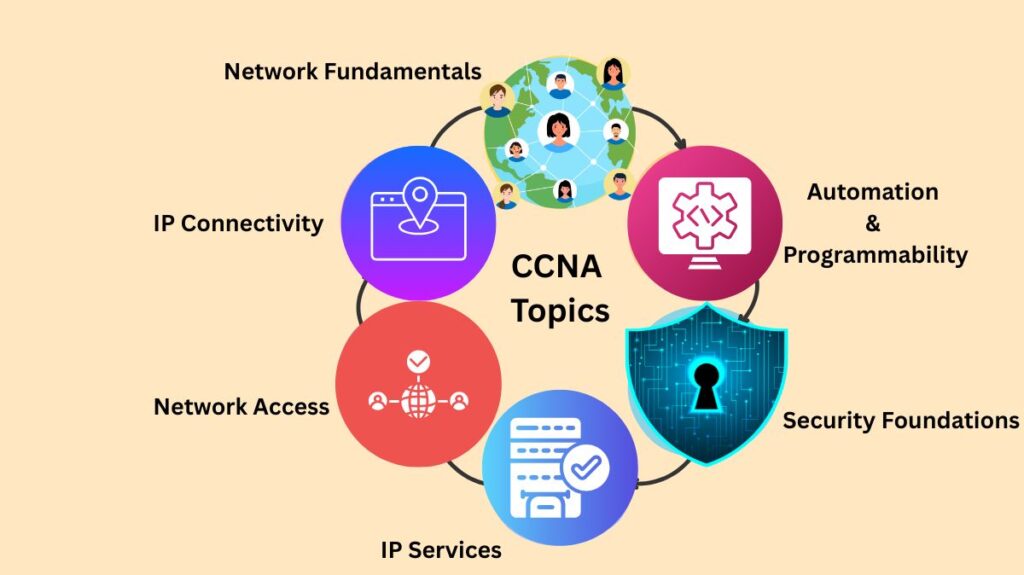Cisco Systems offers an entry-level IT certification called the Cisco Certified Network Associate, or CCNA. It is intended to verify a person’s fundamental networking knowledge and abilities. We discussed the following things in this blog: What is CCNA?, Purpose and Recognition; CCNA topics; Importance and Career Advancement; and the Certification Process.
What is CCNA?
Cisco Systems offers a well-liked networking certification course called CCNA (Cisco Certified Network Associate). A candidate’s ability to install, configure, run, and troubleshoot medium-sized enterprise branch networks is tested by the CCNA certification. Network fundamentals, network security, network infrastructure, and network automation are just a few of the topics covered in the CCNA certification course.
The capacity to configure, comprehend, manage, and troubleshoot switched and routed networks is validated by a Cisco certificate.
- It helps users establish a point-to-point connection.
- CCNA provides instructions and examples for creating a network address.
- If you receive CCNA training, you will land a well-paying job.
Also Read About What Is A CISCO Company? Check Cisco Certification Levels
Purpose and Recognition
- In the IT business, the CCNA is highly respected and well-known throughout the world.
- Its goal is to train people for a variety of positions in the networking and IT sector, including network engineer, network specialist, and network administrator.
- Employers will see that you have the necessary abilities to set up, manage, and troubleshoot small to medium-sized business networks.
- It is frequently seen as the first step for people who want to pursue careers in cybersecurity, networking, or IT infrastructure.
- Additionally, the CCNA is a prerequisite for the CCNP and CCIE, two more advanced Cisco certifications.
CCNA topics

A wide range of networking foundations are covered by the CCNA certification:
Network Fundamentals: This covers knowledge of network components including routers, switches, and access points as well as a grasp of how networks (LAN, WAN, and Internet) function. It also covers fundamental networking concepts like topology, protocols, and addressing.
IP Connectivity: This includes knowing how IP addressing (IPv4 and IPv6) and routing are used by devices to interact. It covers the use of both static and dynamic routing as well as IP routing protocols like OSPF and EIGRP.
Network Access: VLANs, switches, and wireless access are covered. EtherChannel, interswitch communication, and VLAN configuration and verification are covered.
IP Services: Common IP-related services like DHCP, NAT, and DNS are covered in this section.
Security Foundations: This includes fundamental network security concepts and setups, such as VPNs and access control lists (ACLs).
Automation & Programmability: This covers the fundamentals of using APIs and configuration management tools, as well as an introduction to network automation and Software-Defined Networking (SDN) concepts.
Importance and Career Advancement
- People can gain access to a variety of networking positions by earning the CCNA certification.
- The certification process aids in the development of a solid foundation in networking technologies and principles.
- Obtaining CCNA certification may result in improved employment prospects and increased pay.
- Network administrator, network engineer, systems administrator, network support technician, and cybersecurity analyst are possible job pathways.
Also Read About What A Network Is And What Are Benefits Of Networking
Certification Process
- Test: The 200-301 CCNA is the only proctored test required to earn your CCNA certification.
- Exam requirements: Although there aren’t any official requirements, Cisco advises that applicants have at least a year of experience with Cisco products, a basic understanding of IP addressing, and a solid understanding of network principles.
- Recertification: Three years are allotted for the CCNA certification. You can obtain continuing education credits or pass the same or a more difficult Cisco exam to renew it.
CCNA security
The Cisco-retired CCNA Security certification attested to a person’s proficiency in protecting Cisco networks. In order to preserve data availability, confidentiality, and integrity, it concentrated on basic security technologies, network device implementation, troubleshooting, and monitoring. Although the CCNA Security certification is no longer available separately, its principles are now included into the more comprehensive CCNA (200-301) certification, especially in the security area.
